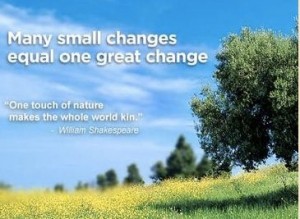Talk, Talk, Talk About Climate Change – It’s Driving Some Well-Intentioned People (like Jonathan Franzen) Crazy
A recent blog posting in Grist by David Roberts explains why some progressive, imaginative people, including the noted and much respected writer, Jonathan Franzen, remain uncertain about the importance of climate change or a bit reactionary to all the attention it seems to be getting in contrast to other pressing environmental problems. Of course, many of us think climate change does not get nearly enough of the attention it deserves.
Franzen wrote an article in The New Yorker (April 2015) subtitled, “Has climate change made it harder for people to care about conservation?” Basically he is disturbed by the Audubon Society and other environmental groups making so much about climate change and its devastating impacts that will occur in the future. Franzen, who clearly cares a lot about our shared environment, is worried that we’ll direct all our efforts at preserving future habitats for birds, neglecting the birds in front of us, and, as a result, there won’t be any birds left to use those future habitats. He would like to be left alone to enjoy and protect “what‘s concrete and vulnerable and right in front of us.” His worry is that “The question is whether everyone who cares about the environment is obliged to make climate the overriding priority.”
Roberts, a clear and cogent thinker and writer on environmental matters, tries to help Franzen, and others similarly minded, out of their dilemma. Note 1. To get a sense of how climate change dominates discussions, on why talk about climate change still annoys some people, listen to the language Roberts uses to describe the conversation:
• climate is colonizing everything
• climate change is distant – geographically, politically, temporarily and emotionally
• climate change cannabilizes every environmental concern
• climate change is blotting out everything else, sucking up all the time, attention and money
• climate change’s totalizing tendency
• it ends up subsuming everything else
• every approach to climate is partial and blinkered because climate is everything
• it is so broad and comprehensive that it gets lost in polls
At the end of the litany, we are left breathless: climate change is the bloody plague.
And it is. But Franzen wonders whether we have to rub it in.
If Franzen is annoyed that talk and actions about climate change are distracting us from simpler yet pressing needs to protect some birds, somewhere, and NOW, then Roberts suggests that Franzen, and other like situated people, should act on what he calls these “proximity problems,” which will in effect serve as a contribution to the larger cause of climate change. The more immediate, narrower environmental problem becomes, in effect, a proxy for the more distant, larger cause of climate change. Focusing on the immediate, here-and-now allows Franzen and others to escape all the chatter about apocalyptic climate change and yet do something to preserve a pocket of earth or wildlife or whatever.
Roberts suggests individuals focusing on a “climate proxy” cumulatively will indirectly affect climate change. It is not clear how Roberts thinks a local “climate proxy” will actuate changes in either personal behavior or local, regional, national or global policy and climate actions, which in turn will spare the planet and us the worst effects of climate change.
Let me suggest a different metaphor. We must get a global deal on climate change and there are lots of well-connected, high-powered environmentalists, especially in the larger national and international environmental groups, as well as civil societies, and political and religious leaders who are concentrating on making that happen. These are actors playing out a drama on the grand, global stage where larger actions are unfolding, or imploding, as in a Chekov or Beckett play. In the meantime there are many more out there who care deeply for our shared environment and whose only access to the global stage is as an audience. The actors need an audience, and the bigger the better; the audience needs to be engaged with the play. At the end of a particular performance, the actors prepare for the next performance – think IPCC Conference of the Parties (COP). Meanwhile, the audience goes home, engaged by the performance, and tries to preserve what we have now, and for the future, through small gestures, like replacing incandescent light bulbs with lower-wattage bulbs or working in the garden. Others go home and write about climate change.
The actors on the grand stage need the audience’s emotional and financial and political support, and applause. Members of the audience needs to be engaged by what they see and hear on the stage, and to allow that experience to change them, in whatever small ways.
Meanwhile, Franzen encourages all of us to “not only act locally but, by necessity, think locally as well.”
I much prefer the older adage: Think global, act local.
Or: Each to her own.
Note 1. David Roberts has just left grist to join vox.com
Sources
David Roberts, “Jonathan Franzen is confused about climate change, but then, lots of people are,” Grist (2 April 2015). grist.org/living/jonathan-franzen-is-confused-about-climate-change-but-then-lots-of-people-are/
David Roberts, “Everybody needs a Climate Thing,” Grist 6 April 2015). grist.org/climate-energy/everybody-needs-a-climate-thing/
Jonathan Franzen, “Carbon Capture: Has climate change made it harder for people to care about conservation?” The New Yorker (6 April 2015). www.newyorker.com/magazine/2015/04/06/carbon-capture



No comments yet, add your own below